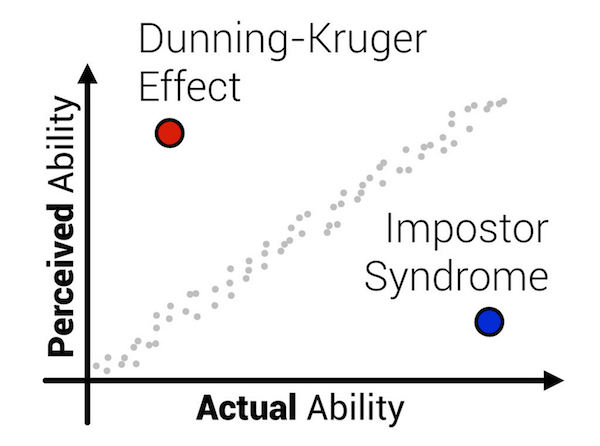OK, just a bit of mild fun today.
Ever felt that you are caught between a rock and a hard place? OK, so how about this.
There is what is known as Impostor syndrome.
This is where an individual is unable to come to terms with their abilities and skills, even when faced with clear decisive evidence that they are good at what they do. They feel that they are a fraud and do not deserve the recognition that they have received for various accomplishments. Now let’s be clear, there is no evidence that this is a distinct personality trait, but rather is feeling that we all at one time or another encounter to various degrees. For some high achievers it can potentially be quite strong, so much so, that such individuals work hard to cover up the fear they have of being exposed as a fraud, and of course that hard work, then leads to even more recognition and praise.
Then there is what is known as the Dunning–Kruger effect.
This is where an individual is overly confident with a very strong belief in their own skills and abilities, despite clear decisive evidence that they are completely and utterly incompetent, so much so, that they are totally oblivious to the degree and depth of their incompetence.
So how then do we square this circle?
If you truly feel that you have done a good job, is that “Dunning-Kruger”, or have you actually done a good job. On the other hand if you feel that what you have done is not a good job, is that then “Imposter Syndrome” or are you being realistic?
Hey wait a second, no matter which way you swing here, you simply cannot win.
Ah but wait, it is not like that of course, because the vast majority all fall somewhere between the two, and so these are both the tail ends of either side of a bell curve.
Oh but wait, it is not that simple either.
The truth is that all of us feel overly confident about some things at some times, and also feel unjustly like underachievers at other times. It is all part of being human and need not be something we should ever be overly concerned about, unless of course it becomes a problem to such a degree that we are quite oblivious to it.
Bottom line: if you are truly worried about either of these applying to yourself, then they don’t, because the very fact that you are seriously considering it means that they don’t, or is that you now successfully fooling yourself? Ha, I told you not to take today’s posting too seriously.
It is of course still worth understanding the various cognitive biases that humans are susceptible to at one time or another, it is one of the tools you should keep handy within your skeptical toolbox.
Links
Here are some lists of thinking errors that can prevent you from accurately understanding reality
